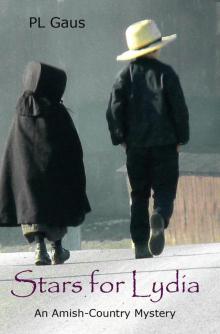- Home
- P. L. Gaus
Whiskers of the Lion Page 2
Whiskers of the Lion Read online
Page 2
So the well water tanks in the attic were empty, Armbruster muttered. Of course. They would have disconnected the windmill when they left. Again he felt the abandonment. Even the water had deserted the pipes.
Down on the first floor, on the screened back porch, Armbruster took an old rag from a Shaker peg and sat on a wicker chair to wipe the mud from his new Florsheims. Standing again, he turned in place to remember his last time in the house. He and Ricky Niell had guarded the Jonas Helmuth family while Robertson hunted the county roads for Teresa Molina’s gray Buick, which had been described by Fannie Helmuth and identified among others registered in northern Ohio by after-market tire prints that Armbruster had molded from the muddy edge of the Helmuths’ driveway.
Armbruster remembered that day. He had guarded the rear of the house from this very porch. Down the interior stairs, the family had taken shelter in the basement.
Armbruster crossed back through the kitchen to the top of the basement steps. Using the handrail, he eased down the steps in the dark until his feet found the dirt floor of the basement. He could see only the dim shape of an eight-by-eight upright post, and he reached out for it, caught his suit on a protruding nail, pulled back, and heard the expensive fabric of his sleeve take a short rip. He groaned in self-reproach, fingered the tear, and climbed back up the steps, angry with himself for the vanity of his new attire. In better light, he inspected the tear in the sleeve, rolled his eyes, and muttered a scolding invective at himself. Then he pulled off his ruined suit coat and tossed it in a heap onto the kitchen counter.
A battered red kerosene lantern was hanging beside the back porch door. Armbruster found matches in a kitchen drawer, lifted the globe to light the wick of the lantern, set the globe back into place, and turned again for the basement steps. Lantern in one hand, railing in the other, he descended.
The lantern’s flame threw a troubled glow of yellow light onto the basement’s dirt floor and gave dim outline to the posts and walls. On the far wall ahead of him, there were wood shelves for canning jars. The shelves were empty. Against the wall to his left there was a stack of empty wooden crates and pallets, held in store perhaps for firewood. To his right, clotheslines hung lifelessly from hooks in the braces. His eyes adjusted more to the lantern’s anemic glow, and Armbruster saw worn leather tack and harnesses, pegged to the wall beyond the weary clotheslines. And it was only then that he noticed the faint odor of urine, mixed strangely with something sweet. Maybe alcohol.
Armbruster took another anxious circuit around the front portion of the basement, then turned to the back part behind the step risers. A boarded partition nailed to the risers partly divided the front half of the basement from the back. He rounded the corner of the partition and saw a vague and disturbingly upright form strapped to the far side of another eight-by-eight post. He turned the wick of the lantern higher and advanced. The question, Howie? caught in his throat, and he asked aloud, “Who’s there?”
No movement. No sound. He stepped forward and came around to the other side of the post. He took a nervous step in place, and something sounding like plastic cracked under the sole of his shoe. He lifted the lantern to eye level, advanced two steps, and was startled by the swollen, bloodied face of Howie Dent.
There in the basement, in the lantern’s pale light, Probationary Detective Stan Armbruster stared with shock at the pale death mask of a man who had died badly after hideous torture. He stared slack-jawed at the evidence that Fannie Helmuth might now be dead as well. He stared with an addled mind at the proof that was written in Howie Dent’s ashen face. The proof of both the beginning and the end of Armbruster’s new career, over and done with in this morning’s single clang of a metaphorical bell.
The big celebration breakfast rumbled in Armbruster’s gut like corked fury. He set the lantern down on the dirt floor and circled back to the steps fighting a vomit reflex. With one hand clamped over his mouth and the other hand pulling himself along the railing, he labored up the steps. Running then, and losing control of his stomach as he crossed the kitchen linoleum, he spewed vomit onto his shirt and tie, and hurtled himself on unsteady legs down the back steps. Outside Armbruster doubled over onto his hands and knees and felt a wet chill soak into the expensive fabric of his new suit pants as he heaved the rest of his breakfast onto the grass of the back lawn.
Then, with his legs rubbery and his mind struggling to make sense of a useless tangle of grotesque images and fragmented thoughts, Armbruster got himself somehow back to his Corolla. He sat behind the wheel, pulled the microphone off the dash hook, and clamped the fingers of both trembling hands over the switch to radio in. “Armbruster! Over.”
He eased back in the driver’s seat, groaned from the gut, and drifted among ragged thoughts. He was alone. He wasn’t sure how the new temp dispatcher would handle him. He was defeated. She had started just yesterday. He was finished. Adele “Just Call Me Del” Markely. Brought over from the Mansfield Highway Patrol to handle communications while Ellie Troyer-Niell was bedridden during a difficult third trimester with twins. Ricky Niell was home with Ellie, taking paternity leave. Mind wandering, Armbruster realized that he didn’t know if Del Markely had responded to his radio call.
“Base, this is Armbruster. OK?”
“Go ahead,” Markely responded evenly.
“Howie Dent is dead. Helmuth farm. Need the captain. Medical Examiner. Everybody. Over.”
“What’s that twenty, Armbruster?”
“Helmuth farm. North of Charm.”
“I’m gonna need more than that, Armbruster.”
“The sheriff knows where it is, Del! Just send everybody out here!”
Exhausted by shock and emotion, Armbruster switched off and pulled himself out of his car. Leaning against the front fender like a derelict hobo, he felt his stomach heave again, this time dry, and he bent over at the waist to wait it out. Then he sank to his knees, turned himself around, flopped down with his legs out straight, arms limp at his sides, back resting against the front wheel, with cold wet mud soaking into the seat of his new suit pants.
“A new suit, Stan?” he whispered to himself. “Really? Get a grip! What happened here? THINK.”
Fannie Helmuth had disappeared in Charlotte with Howie Dent in April. On a bus run from Sugarcreek to Sarasota.
Robertson had been manic since then to find them. Best hope, that Fannie Helmuth and Howie Dent were hiding in one of the remote Amish colonies that were scattered across America. Second-best hope, that knowing the danger to Fannie, they’d never try to come home. Not without the sheriff’s help.
But now they had come home. At least Howie Dent had.
It had all started with the murder of Ruth Zook, an Amish girl vacationing in Sarasota’s Pinecraft colony. Murdered by the Teresa Molina drug gang. For refusing to deliver a suitcase of drugs that she had been coerced into carrying on the bus ride home to Ohio.
Her friend Fannie Helmuth had then gone to the sheriff to say that she had earlier brought home a suitcase, too, one that she now suspected had also held drugs. She had carried the suitcase for a woman in an old gray Buick. Teresa Molina.
Then the sheriff’s sending Ricky Niell on the chase to Florida, hunting the Molinas. And a shootout in Sarasota/Bradenton’s eastern outskirts. Killing Dewey Molina, cousin to Teresa. And Teresa Molina and the rest of her crew? Vanished like smoke on the wind.
So Fannie Helmuth had fled the sheriff’s protection. With Howie Dent’s help. And Ricky Niell had tracked them as far as the bus depot in Memphis.
Thus you were assigned the Dent watch, Stan, Armbruster chastised himself grimly. Show up three times a week and ask Richard and Susan Dent if they’ve heard yet from their son. Two days ago, they had answered again in the negative. Now their son was dead.
So here you sit, Stan, Armbruster thought, laughing nervously. New suit ruined, and you failed Howie Dent. Celebration breakfast spewed a
cross the lawn, and you failed Fannie Helmuth. Promotion to detective now a total loss, and you failed your first day on the job.
And the whole happy gang is headed right here to your position.
And what position is that, Stan?
The unwitting victim of a ricochet.
Fumbling uselessly with the quandary of unringing a bell.
Butt down in the mud.
On the worst day of your life.
2
Wednesday, August 17
7:50 A.M.
AFTER ARMBRUSTER’S call, Holmes County’s captain of detectives, Bobby Newell, was first to arrive at the Helmuth farm. Newell had planned this as a personal day, and when the call had come in from dispatcher Del Markely, he had been standing on the second tee, dressed in blue-and-white-checkered Loudmouth golf pants, a matching knit golf shirt, and a white visor. He changed out of his golf shoes before leaving the parking lot at the country club, and he drove for Troyer’s Ridge still dressed in the rest of his golf clothes.
A short fifteen yards into the Helmuth drive, Newell parked, switched on the flashers of his sedan, and climbed out. He saw Armbruster standing beside his Corolla in front of the yellow VW farther down the drive, and Newell raised his voice. “Tire tracks, Stan? Footprints? What?” He tossed his golf visor in through the open window and waited for an answer.
Armbruster shook his head, called back, “All washed out in the rains,” and waved Captain Newell forward. Once Newell had reached his position, Stan added, “If anything was ever out here to see, I’ve already tracked over it. Then the rain washed it out.”
“You’ve been inside?”
“Everywhere. He’s in the basement.”
“You sure it’s Dent?”
Armbruster nodded. “I’ve been staring at his driver’s license photo for the last four months. He’s a mess, Captain, but it’s Dent.”
“Is Fannie here, too?”
“No.”
“You sure, Armbruster? I mean dead certain?”
“Pretty sure, Captain. Before I found Dent, I had gone through the whole place.”
Newell rubbed with frustration at the small black patches of hair over his ears, and then he ran a palm nervously over his bald pate. “We’ve got to be sure about her, Stan.”
At the front end of the long drive, the medical examiner’s van turned in and stopped. Melissa Taggert stepped out at the driver’s door and called down the drive, “OK to move up?”
Newell waved her forward, and Taggert pulled the van around the captain’s sedan. Behind her, a cruiser pulled in and stopped, and Pat Lance got out in her customary blue pantsuit. Newell waved her forward, too, and Pat came ahead on foot while Taggert parked her ME’s van beside the back corner of the house. As Pat Lance was walking up to Armbruster’s Corolla, Taggert called back, “Where is he, Stan?”
Grimly, Armbruster shook his head. “In the basement.”
Joining the others beside the Corolla, Taggert next asked, “OK, who has been inside?”
Armbruster gave a chastened shrug of his shoulders. “Only me, but I tracked it up, Missy. Went up and down the basement steps at least twice with muddy shoes.”
Missy Taggert turned back to her assistant, who was just opening the rear doors of the van. “Booties and gloves for now,” she called out. “We’ll dust and photograph everything going down the steps. But nobody goes down to the basement floor until I clear it.”
The assistant pulled boxes and a camera bag out of the van and disappeared around the back corner, heading for the rear porch door.
Armbruster shook off dejection. “I wasn’t careful, Missy. You’ll find my prints on the railing and in the kitchen. Everywhere, really. And muddy footprints, too. I thought I’d find Dent in the house somewhere. Never thought he’d be dead.”
Intending encouragement, Missy said, “Maybe we’ll find what we need with the body.”
Melissa Taggert, Missy to her friends, had first held the elected position of Holmes County Coroner. Then, because of her medical and forensics credentials from Ohio State University, among others, she had been appointed Holmes County Medical Examiner. On duty, she dressed perpetually in either green or blue scrubs, and she managed not only the county morgue in the basement of Millersburg’s little Joel Pomerene Memorial Hospital, but also forensic investigations out of a lab she had built and equipped there with the aid of her husband, Sheriff Bruce Robertson. A little younger than her big husband, and considerably slimmer, she still had a fair and youthful complexion and moderately long brown hair that had been naturally curly since she was a child.
She studied the chagrin written into Stan Armbruster’s expression and said, “You found him, Stan. That’s a good thing. Otherwise, he might have rotted there for weeks.”
Seeming too distracted to notice her attempt at kindness, Armbruster said only, “I need a change of clothes. Need to clean up.”
“OK,” Taggert said, “but what am I going to find in the basement? Tell me that much before you go.”
“It’s dark,” Armbruster said. “I left a kerosene lantern down there, but you’ll need flashlights to see anything clearly.”
“Or lights on a stand,” Taggert said to Newell. “With a generator.”
The captain nodded a command to Pat Lance, and Lance said, “Right. Lights and a generator.” She stepped off to the side to make a call.
Then Captain Newell pressed Armbruster. “Tell us what you saw, Stan. All of it.”
“I got a good look at his face. He’s bound to an upright post behind the steps. Strapped in place with rope or something. Maybe tape. And I held the lantern right up to his face. I lost it, Captain.”
“Then how can you be sure Fannie Helmuth isn’t down there, too?” Newell advanced. The muscles in his neck and jaw were bunching into knots. His arms were flexing and his fingers were clenching and opening as if he’d just finished a workout with his free weights and needed to dump tension from his muscles. Newell seemed to notice the tension he was broadcasting, so easing his tone, he said, “Relax, Stan. Just tell us what you know.”
Armbruster hesitated. “I didn’t see her, Captain. Fannie, I mean. Doesn’t mean she isn’t here.”
Newell nervously adjusted his thick black glasses, pulled Pat Lance along the drive toward the back corner of the house, and called over his shoulder, “Where’s the lantern, Stan?”
Armbruster shouted at their backs, “In the basement, right at his feet,” and he leaned unsteadily against the front fender of his Corolla.
Taggert ran after Lance and the captain, caught up with them on the back steps, and said, “Wait. Booties and gloves.”
At the back of the van, the three put gloves on their hands. Taggert pulled three flashlights out of a drawer, and once they were standing on the linoleum floor of the kitchen, they put booties over their shoes. Then Captain Newell led Lance and Taggert down the basement steps.
They first searched forward from the base of the steps to the far wall with its canning shelves. Then they worked down the left side of the basement, turning over pallets and crates to look under them for a second body. Once at the back corner, they could see the body of Howie Dent strapped to the post under the steps. He was illuminated by the erratic, yellow glow of the flame that Armbruster had left burning in the kerosene lantern at Dent’s feet.
Newell held the lantern up to Dent’s face as Taggert approached with her flashlight. She paused and then took a step forward for a better look, and she felt something crunch under her foot. She backed carefully away, pointing with her flashlight to debris on the basement’s dirt floor. Back at the base of the steps, she directed Lance and the captain to search the other corners of the basement, and once they were certain that Fannie Helmuth wasn’t there, she led them back up the steps, saying, “We won’t go back to the body until we’ve rigged the lights.” Then she went outsid
e to her van.
In the kitchen, Captain Newell pulled Detective Lance aside. “How much of him did you see, Pat?”
“Enough,” she said. “He was tortured. I’ve never seen anything like that. Looked to me like his whole body was one vast carpet of blisters.”
“I saw punctures in the skin,” Captain Newell said. “Like needle marks at the centers of swollen blisters.”
Missy came back inside with her ME’s bag. “That’s an ugly way to die,” she said. “I mean strapped in place like that. How long until I’ll have those lights?”
“I called,” Detective Lance said. “It won’t be long.”
3
Wednesday, August 17
11:15 A.M.
WELL BEYOND the bounds of propriety, and significantly past all pretense to the contrary, Sheriff Bruce Robertson was indignant. Also irate, and why try to hide it? He wanted them all to know—his wife, the medical examiner; his captain of detectives; and all the patrol captains. His three detectives, and all the deputies inside and outside the jail. Everyone for miles around for that matter, Amish and English alike. The whole state of Ohio, if need be. Because murder in Holmes County was one thing, but torture/murder was quite another.
The sheriff’s deepest instincts told him to charge into the investigation of this murder, but his intellect told him to wait. It told him to let his new detective bureau take the lead, and with mounting difficulty, Robertson was struggling to obey his intellect. So outside on the Helmuths’ driveway, as Bobby Newell’s and Missy Taggert’s investigations crept forward in the farmhouse, the heavy sheriff paced beside his blue Crown Victoria, relegated to the role of an observer.
Truly, it galled Robertson to have to watch from a distance. Scuffing at the gravel of the drive, the sheriff heard himself growl, and he recognized the agitation that this morning of disengagement was causing him. He marched back to his Crown Vic, bent over to the glove compartment, and pulled out his bottle of Ativan. This was his latest prescription. Something new to address his long summer’s anxiety over the failed search for Fannie Helmuth. Years before, he had taken Ativan in combination with an antidepressant. That was before he had married Melissa Taggert.

 Stars for Lydia
Stars for Lydia Cast a Blue Shadow
Cast a Blue Shadow Separate from the World
Separate from the World Clouds without Rain
Clouds without Rain Blood of the Prodigal
Blood of the Prodigal Whiskers of the Lion
Whiskers of the Lion A Prayer for the Night
A Prayer for the Night Broken English
Broken English Harmless as Doves: An Amish-Country Mystery
Harmless as Doves: An Amish-Country Mystery